This story appears here courtesy of TheChurchNews.com. It is not for use by other media.
By Scott Taylor, Church News
Commemorating the 75th anniversary of the Universal Declaration of Human Rights, Elder Quentin L. Cook of the Quorum of the Twelve Apostles used messages delivered Wednesday, December 6, at Parliament and one of London’s historic city churches to extol the benefits of human rights and freedom of religion as well as call for continued efforts worldwide.
- Cook-Parliament-2023
- Cook-Parliament-2023
- Cook-Parliament-2023
- Cook-Parliament
- Cook-Parliament-2023
- Cook-Parliament-2023
- Cook-Parliament-2023
- Cook-Parliament-2023
- Cook-parliament
- Cook-Parliament-2023
- Cook-Parliament-2023
| Temple Square is always beautiful in the springtime. Gardeners work to prepare the ground for General Conference. © 2012 Intellectual Reserve, Inc. All rights reserved. | 1 / 2 |
“I believe the United Kingdom has been at the forefront of extending respect, toleration and legal protection for religious freedom to people of all faiths — not just Christians. You are a powerful example ...,” said Elder Cook. “We should never give up on advocating for and declaring the human rights that we are celebrating here in the U.K. Parliament today.”
Religious freedom and accountability to God benefit individuals and countries, he added. “Accountability to God for our relationships with each other is a powerful force for good and strongly supports democracy. Those who feel accountable to God also feel a responsibility to improve the lives of the less fortunate and to follow the laws of the land.”
While many challenges still exist and need to be addressed, Elder Cook said, “the principal components and the essential foundations which commenced in the British Isles are still central today.”
Accompanied by his wife, Mary, Elder Cook provided the keynote address in a morning session in the Portcullis House of the Palace of Westminster. Also offering remarks were U.K. Prime Minister’s Special Envoy for Freedom of Religion or Belief Fiona Bruce, a member of Parliament; Parliament member Brendan O’Hara, a leader of various All Party Parliamentary Groups, including that of International Freedom of Religion or Belief; professor Stephanie Barclay, director of Notre Dame Law School’s Religious Liberty Initiative; and professor Brett Scharffs, director of the Brigham Young University Law School’s International Center for Law and Religion Studies.
In addition, Elder Cook spoke at an afternoon anniversary event sponsored by the FoRB Foundation, a U.K.-registered “Freedom of Religion or Belief” charity.
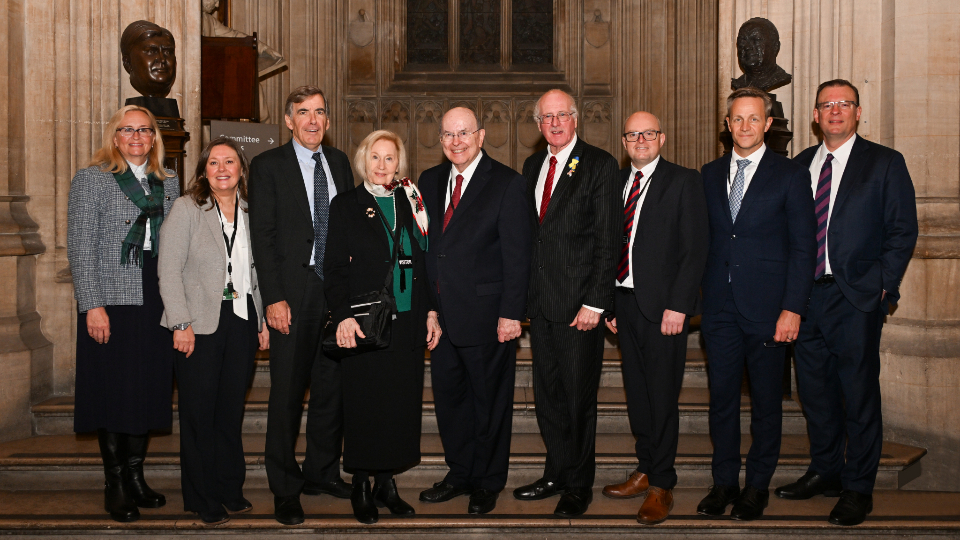
Cook-Parliament-2023
Elder Quentin L. Cook of the Quorum of the Twelve Apostles, center, and his wife, Sister Mary Cook, pose with Parliament members and other participants of the forum discussion on religious freedom, in the Palace of Westminster in London, England, Wednesday, December 6, 2023.2023 by Intellectual Reserve, Inc. All rights reserved.Freedoms That ‘Speak to and Belong to All’
The Universal Declaration of Human Rights — announced December 10, 1948, by the United Nations’ General Assembly — comprises 30 rights and freedoms that “speak to and belong to all” and are the basis for international human rights law, said Elder Cook in the morning meeting. “It was the first time that a universal global agreement put human rights — not power politics — at the forefront.”
Article 18 states: “Everyone has the right to freedom of thought, conscience and religion; this right includes freedom to change his religion or belief, and freedom either alone or in community with others and in public or private, to manifest his religion or belief in teaching, practice, worship and observance.”
The Church of Jesus Christ of Latter-day Saints supports the religious freedom of all faiths as well as people with no faith, said Elder Cook, highlighting two basic principles demonstrating the Church’s commitment to freedom of religion for all:
- The 11th Article of Faith: “We claim the privilege of worshipping Almighty God according to the dictates of our own conscience, and allow all men the same privilege, let them worship how, where, or what they may.”
- Joseph Smith’s assertion of civil and religious liberty: “It is love of liberty which inspires my soul, civil and religious liberty to the whole of the human race.”
Elder Cook expressed appreciation for the British Isles’ history and parliamentary actions that served as essential precursors to achieving human rights and religious freedom on an international scale. Included in those historic actions is the 1215 signing of the Magna Carta, which Elder Cook had celebrated in an October 2019 address given at England’s University of Oxford.
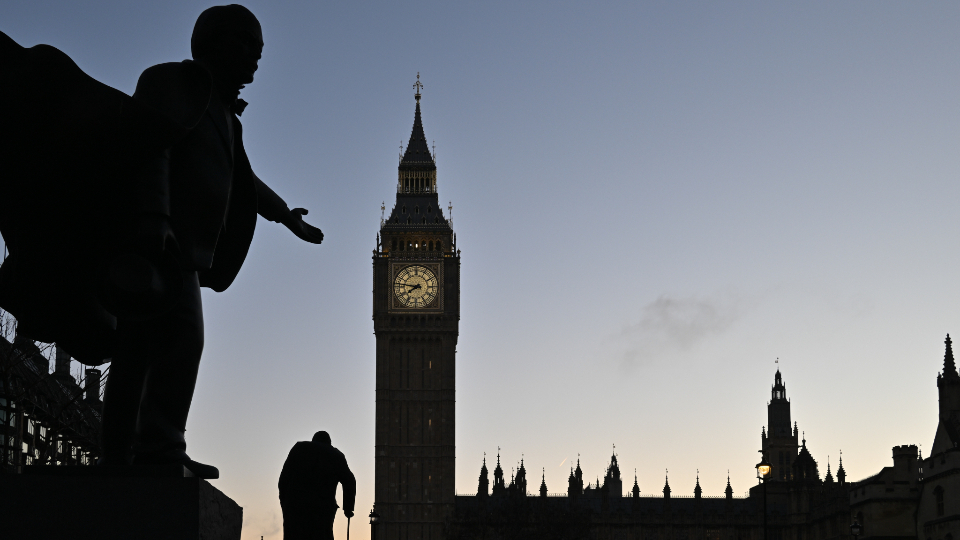
Cook-Parliament
The Palace of Westminster glows in the early morning light prior to a meeting at the site with Elder Quentin L. Cook of the Quorum of the Twelve Apostles to discuss the issue of religious freedom, in London, England, Wednesday, December 6, 2023.2023 by Intellectual Reserve, Inc. All rights reserved.“When you combine the historical impact of Magna Carta, the English common law and the English Bill of Rights of 1689, the principle of individual liberty existed in England in early times,” said Elder Cook at Parliament, then mentioning the United States Declaration of Independence’s phrase “all men are created equal, that they are endowed by their Creator with certain unalienable rights.”
He added: “The acknowledgment of God, the Creator of the universe, as the ultimate giver of essential rights, is proclaimed in a magnificent fashion and reflects the cherished beliefs of people across the world. The concept that ‘all men are created equal’ has made significant strides, but there is much yet to be accomplished.”
Freedom of religion and freedom of speech are both the heart and the foundation of a representative democracy, with the freedom to believe in private and to assemble and exercise belief and speech in the public square being essential to protecting unalienable rights, Elder Cook said. However, he noted, no single church should be the “established church” with legal rights that adversely impact the religious faith of those whose beliefs are not in accord with the established church’s tenants.
He spoke of his great-great-grandfather Heber C. Kimball, the Church’s first missionary to serve in the British Isles, in 1837, and the groundwork of Parliament acts earlier in the 19th century that created religious freedoms apart from the established and predominant Church of England. Because of the newly passed laws, Elder Kimball and other missionaries were able to obtain a license to preach in Preston, England, certifying under oath that the queen’s laws would be followed but excluding the requirement to make oaths of allegiance to the established church.
“This was a crucial way forward toward resolving the issue of an established faith in the land of many faiths,” Elder Cook said, acknowledging that the Church of Jesus Christ has grown from several thousand members when Heber C. Kimball arrived in England to now more than 17 million worldwide. “I am grateful for the religious freedom extended to my missionary forebear and invoke the blessings of heaven upon this Parliament.”
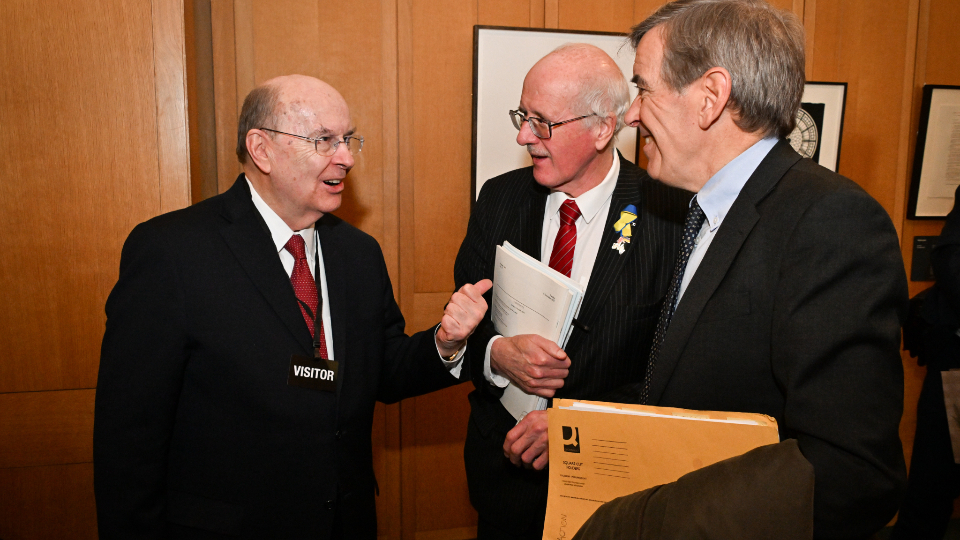
Cook-parliament
Elder Quentin L. Cook of the Quorum of the Twelve Apostles speaks with Parliament member David Rutley and other participants of the forum discussion on religious freedom, in the Palace of Westminster in London, England, Wednesday, December 6, 2023.2023 by Intellectual Reserve, Inc. All rights reserved.In a subsequent question-and-answer session, Elder Cook said he was optimistic for the future of religious freedom. But in cautioning against absolute applications in issues involving the separation of church and state, he quoted President Dallin H. Oaks, first counselor in the First Presidency. “This is not a call for doctrinal compromises,” President Oaks said, “but rather a plea for unity and cooperation on strategy and advocacy toward our common goal of religious liberty for all.”
Tone-deaf to the Music of Faith
The afternoon event was held at The Sanctuary, the Diocesan hub for the Coptic Orthodox Church in London, located in the St. Andrew-by-the-Wardrobe, a 12th century church that was destroyed in the 1666 Great London Fire, rebuilt and damaged in World War II bombing.
Joining Elder Cook and O’Hara in providing afternoon messages were Archbishop Angaelos, the Coptic archbishop of London; and Matthew Jones and Deb Barry, both of the FoRB Foundation.
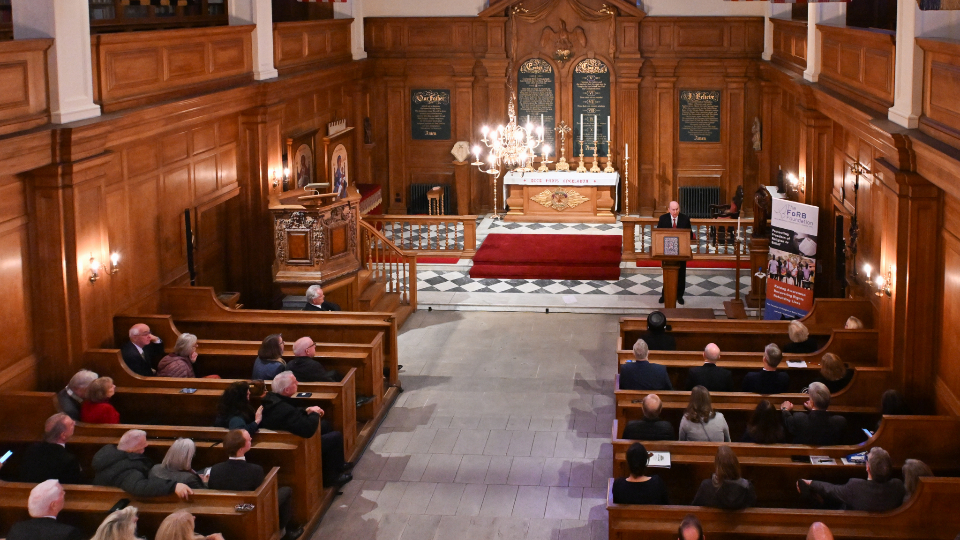
Cook-Parliament-2023
Elder Quentin L. Cook of the Quorum of the Twelve Apostles speaks about religious freedom during a meeting at The Sanctuary (Coptic Orthodox Church), St. Andrews-by-the-Wardrobe, in London, England, Wednesday, December 6, 2023.2023 by Intellectual Reserve, Inc. All rights reserved.Elder Cook quoted the late Rabbi Jonathan Sacks of the United Hebrew Congregations of the British Commonwealth. When addressing how secular parts of the world have become, Rabbi Sacks blamed one culprit as “an aggressive scientific atheism tone-deaf to the music of faith.”
Two blessings lost when society is tone deaf to the music of faith, said Elder Cook, are:
- The way religious accountability benefits individuals, countries and societies.
- The multitude of good works that religion inspires people of faith to perform on behalf of others.
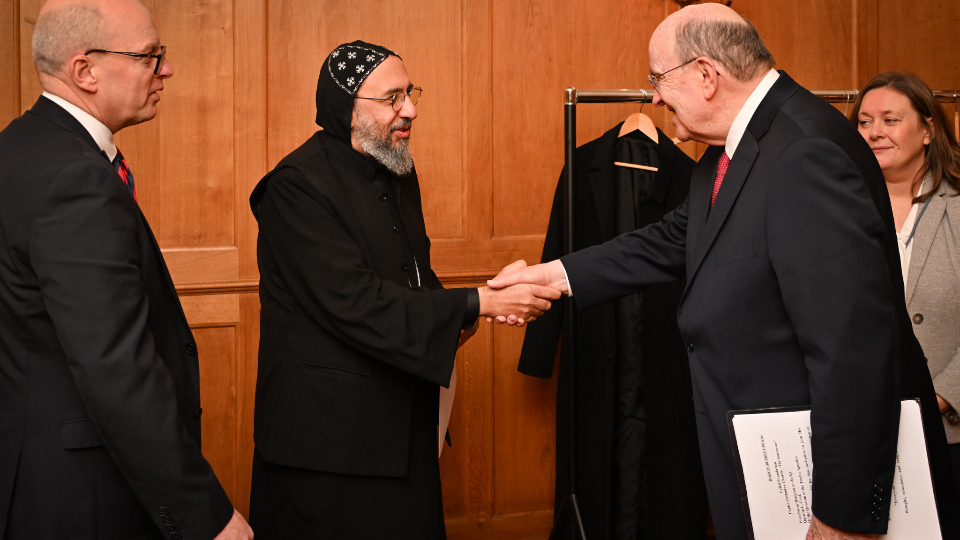
Cook-Parliament-2023
Archbishop Angaelos of London Coptic Orthodox Church greets Elder Quentin L. Cook of the Quorum of the Twelve Apostles and Matthew Jones of the FoRB Foundation (left) following their remarks about religious freedoms and civil liberties during a meeting to discuss the issues at The Sanctuary (Coptic Orthodox Church), St. Andrews-by-the-Wardrobe, in London, England, Wednesday, December 6, 2023.2023 by Intellectual Reserve, Inc. All rights reserved.The Apostle saluted William Wilberforce — “my personal hero” — and other devoutly religious Christian associates in Great Britain’s history such as Thomas Clarkson, Charles and John Wesley and Hannah More, who each felt an overpowering sense of accountability and responsibility to God. Wilberforce is remembered for being the principal force resulting in Great Britain’s abolition of slavery in 1833.
Elder Cook also acknowledged the Rev. Martin Luther King Jr. and his work in America’s civil rights movement of the 1960s. “The civil rights movement he led was animated by his religious convictions and people of faith. Much of the power of his message was because of what we might call the righteous music of faith that was deeply felt.”
Elder Cook spoke of the many contributions from faith groups, including those of The Church of Jesus Christ of Latter-day Saints and its humanitarian and welfare collaborations with other global organizations.
Copyright 2023 Deseret News Publishing Company